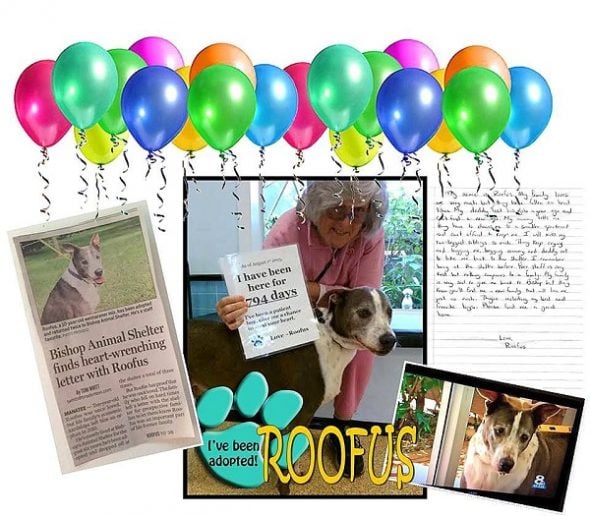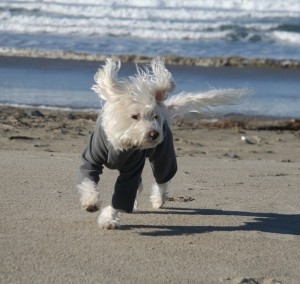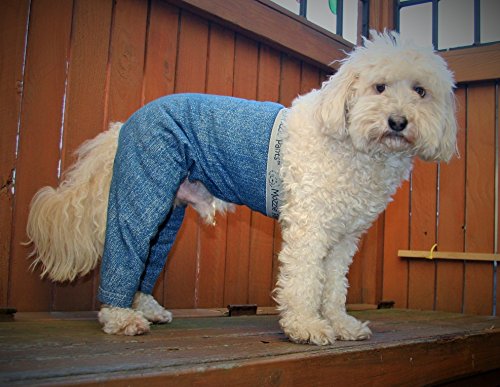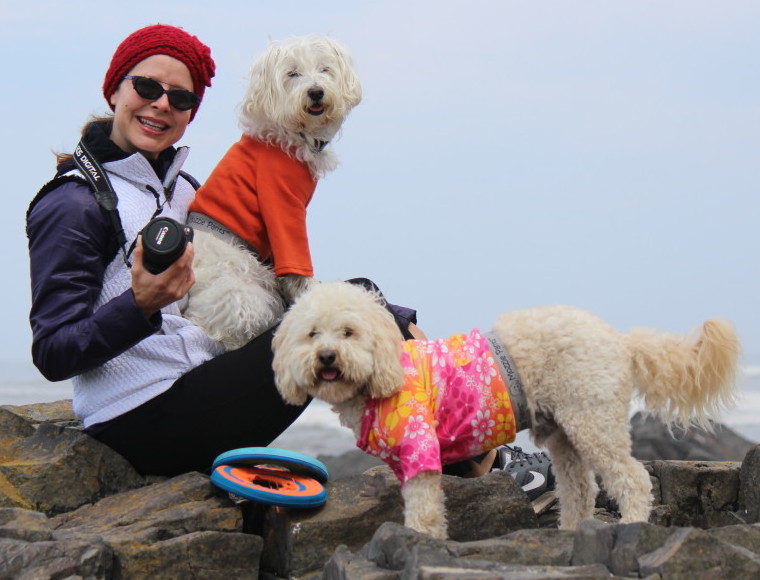Your __dog looks at his water bowl then looks at you. Is it your imagination or is he bored with the same old H20?
Before you start hunting around the kitchen looking for something more interesting to spice up his beverage repertoire, here's a look at some common household drinks and liquids and what the experts say about how safe they are for dogs.
Milk: You always see images of kittens lapping up milk, so why not puppies? But dogs (just like cats) can be lactose intolerant, says the American Kennel Club, which means their bodies have a tough time digesting lactose, the sugar in milk. The unpleasant results can include diarrhea, vomiting, gassiness and loose stools. If you try a little bit of milk and your __dog doesn't have any negative symptoms, it's OK to give a couple of tablespoons occasionally as a treat. But watch your dog's reaction and make sure you don't give too much too often. Milk is high in fat and natural sugars, points out the AKC. If your dog has too much fat or sugar in his diet, it can lead to serious issues like obesity and pancreatitis.
Alcohol: Some people think it's funny to give their dog beer, wine or other alcoholic beverages, but there's nothing humorous about it. Alcohol is toxic to dogs. It can cause "vomiting, diarrhea, decreased coordination, central nervous system depression, difficulty breathing, tremors, abnormal blood acidity, coma and even death," warns the Animal Poison Control Center of the American Society for the Prevention of Cruelty to Animals (APCA). Bottom line, keep it away from your dog.
 The caffeine in coffee can cause problems for dogs. (Photo: Jean C Hebert/Shutterstock)
The caffeine in coffee can cause problems for dogs. (Photo: Jean C Hebert/Shutterstock)
Coffee: It's the caffeine in your morning cup of joe that can be dangerous for your furry BFF. Dogs are more sensitive to caffeine that people are, according to the Pet Poison Helpline. Getting a sip or two out of your cup likely won't do much harm, but any more than that (or eating coffee grounds) can be life-threatening. According to the ASPCA, the worrisome substances are methylxanthines, which are found in cacao seeds, the fruit of the plant used to make coffee. Too much caffeine can lead to vomiting and diarrhea, hyperactivity, a racing heart, panting, excessive thirst and urination, tremors, seizures and possibly even death.
Tea: Like coffee, tea can contain caffeine that can be harmful to your pet in anything more than very small doses. It's best to keep your tea away from your pup.
Soda: Again, it's the caffeine in soda that can be dangerous to pets. If your dog happens to lick up a few spilled drops of your cola off the floor, it's likely no reason to panic. But definitely don't fill up his bowl with your favorite soda, thinking he needs a treat.
Fruit and vegetable juice: There are many fruits and vegetables that are good for your dog, and some that aren't. For example, always steer clear of avocados, grapes and raisins. Juice often has added sugar, so if you want to give your pup something fruity, why not give him actual pieces of apples, strawberries or carrots instead of the liquid version?
 Your dog only needs to drink water, even after a tough workout. (Photo: krushelss/Shutterstock)
Your dog only needs to drink water, even after a tough workout. (Photo: krushelss/Shutterstock)
Sports drinks: After you and your dog take a grueling run or go on a hike, there's no reason to offer your workout buddy a swig of your Gatorade. Dogs need lots of water, especially when they're exerting themselves, but they don't need the extra sodium, electrolytes or vitamins that come with sports drinks, according to "Applied Veterinary Clinical Nutrition." However, if a dog has vomiting and diarrhea, sometimes veterinarians will suggest offering small amounts of sports drinks to prevent dehydration. Before giving the drink to your pet, give your vet a quick call to get her thoughts and ask how much to offer. When your pet feels better, go back to offering him lots of clean, fresh water.
Coconut milk and water: Some people swear by topical coconut oil to help with skin issues like itchiness and hot spots. But when it comes to actually drinking coconut milk or coconut water, the experts are divided. The AKC says both are safe for dogs; just make sure to keep your pet away from the coconut shell, which is rough and can become lodged in his throat. The ASPCA, however, says the liquids are OK only in small amounts. Give your pet too much coconut flesh or milk and you may end up dealing with loose stools, diarrhea or stomach upset. And they recommend avoiding coconut water because it's high in potassium, which can cause health issues. You may want to ask your vet to weigh in on this one.
The no-way, no-how category
Since we're talking about safety, let's veer off the theme of human drinks for a quick PSA: Here are some household liquids your dog should never drink.
 It's a good idea to keep your dog out of the garage so he doesn't sniff around any antifreeze drips or containers. (Photo: Chonlawut/Shutterstock)
It's a good idea to keep your dog out of the garage so he doesn't sniff around any antifreeze drips or containers. (Photo: Chonlawut/Shutterstock)
Antifreeze: Ethylene glycol, the main ingredient in many antifreeze brands, smells and tastes sweet, making it incredibly tempting for dogs (and kids) to want to sample. Keep any antifreeze tightly sealed and way out of reach, and don't let your dog roam unsupervised in the garage or around roads or driveways, suggest the Humane Society of the United States. A few years ago, manufacturers started adding an agent to antifreeze to make it taste bitter, but that doesn't keep all dogs away. Try to choose antifreeze with propylene glycol instead of ethylene glycol; it's safer, but still not risk-free. And know that some paint, cosmetics and even snow globes can contain ethylene glycol.
Other household liquids: There's likely little chance that your dog is going to seek out and drink things like isopropyl (rubbing) alcohol, bleach or household cleaners. But to be on the safe side, keep those things out of your pet's reach, just like you would keep them away from your child. If you ever think that your pet has gotten into something he shouldn't have, make a quick call to your vet.
- Profile
- Latest Stories
Mary Jo DiLonardo writes about everything from health to parenting — and anything that helps explain why her dog does what he does.
- Posted 4 hours ago:
3 new breeds to join the Westminster pack
- Posted 5 hours ago:
Let's focus on what we have in common
- Posted 10 hours ago:
Retired circus animals trade in the big top for new roles as therapy animals
- Posted 11 hours ago:
8 liquids that dogs should avoid
 Zebra finches are popular pets. Selecting the right species of bird is one of the most important decisions you'll make. (Photo: Bespaliy/Shutterstock)
Zebra finches are popular pets. Selecting the right species of bird is one of the most important decisions you'll make. (Photo: Bespaliy/Shutterstock)  Some species of birds need companions. If that's the kind you choose, consider how the increased cost will affect your budget. (Photo: satit sewtiw/Shutterstock)
Some species of birds need companions. If that's the kind you choose, consider how the increased cost will affect your budget. (Photo: satit sewtiw/Shutterstock)  Yellow cockatiels are popular pets because they tend to be less noisy and can be left alone for long periods of time. (Photo: Africa Studio/Shutterstock)
Yellow cockatiels are popular pets because they tend to be less noisy and can be left alone for long periods of time. (Photo: Africa Studio/Shutterstock)  Many birds require special care and attention to keep up their health. (Photo: GrooveZ/Shutterstock)
Many birds require special care and attention to keep up their health. (Photo: GrooveZ/Shutterstock)  When your kids care for or play with the bird, it's a good idea to supervise them, especially at first. (Photo: Shliakhtun Volha/Shutterstock)
When your kids care for or play with the bird, it's a good idea to supervise them, especially at first. (Photo: Shliakhtun Volha/Shutterstock)  Finches tend to be talkative, so consider what your neighbors might think before taking one home to your apartment with thin walls. (Photo: Lewzstock/Shutterstock)
Finches tend to be talkative, so consider what your neighbors might think before taking one home to your apartment with thin walls. (Photo: Lewzstock/Shutterstock) 




































 This X-ray shows the blade inside Macie the puppy. (Photo: PDSA)
This X-ray shows the blade inside Macie the puppy. (Photo: PDSA)